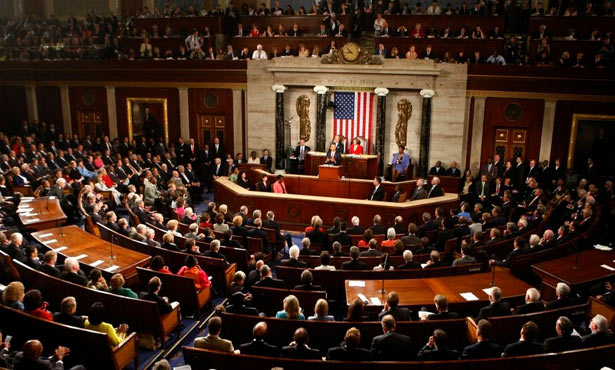When Did Congress Vote to Aid the Saudi’s Yemen War?
The bill introduced by a bipartisan group of House members last week to end the direct U.S. military role in the Saudi coalition war in Yemen guarantees that the House of Representatives will vote for the first time on the single most important element of U.S. involvement in the war—the refueling of Saudi coalition planes systematically bombing Yemeni civilian targets.
In doing so, moreover, the bipartisan bill, H. Con. Res. 81, will provide a major test of Congressional will to uphold the War Powers Act of 1973, which reasserted a Congressional role in restraining presidential power to enter into wars without its approval in the wake of the Vietnam War debacle.
Since the Obama administration gave the green light to the Saudi war of destruction in Yemen in March 2015, it has been widely recognized by both Congress and the news media that U.S. military personnel have been supplying the bombs used by Saudi coalition planes. But what has seldom been openly discussed is that the U.S. Air Force has been providing the mid-air refueling for every Saudi coalition bombing sortie in Yemen, without which the war would quickly grind to a halt.
The Obama administration, and especially the Pentagon and the U.S. military, became nervous about public statements about that direct U.S. military role in the Saudi war after some legal experts began to raise the issue internally of potential U.S. legal responsibility for apparent war crimes in Yemen. Refueling Saudi coalition bombing missions “not only makes the U.S. a party to the Yemen conflict, but could also lead to U.S. personnel being found complicit in coalition war crimes,” Kristine Beckerle, Yemen and UAE researcher at Human Rights Watch,has observed.
The political sensitivity of that direct and vital U.S. military role in the Saudi coalition airstrikes was so great in the last year of the Obama administration that U.N. Ambassador Samantha Power, in an interview with a New Zealand journalist twice declared, deceptively, “We are not involved in carrying out airstrikes in Yemen.”
The bill introduced by Democratic Representatives Ro Khanna of California and Mark Pocan of Wisconsin, and Republican Representatives Thomas Massie of Kentucky and Walter Jones of North Carolina, calls for Congress to “direct” the president to “remove” U.S. military personnel from their role in the Saudi air war against Yemen. It would give the President 30 days in which to end the U.S. military role in support of the Saudi-led war in Yemen unless and until Congress has enacted either a declaration of war or an authorization of those activities.
The co-sponsors believe members will support it because U.S. direct involvement in the Saudi war of destruction in Yemen has enmeshed the United States in the world’s worst man-made humanitarian crisis in many years. Some 542,000 Yemenis, already weakened by starvation, have now succumbed to a cholera epidemic that is far worse than any in the world for the past fifty years, as the New York Times reported in August.
The starvation and cholera epidemic are the consequences of a multi-faceted strategy aimed at creating such civilian suffering as to finally break the resistance of the Houthi-Saleh forces. The Saudi strategy has included:
- Targeting of hospitals, markets and agricultural infrastructure.
- Destruction of cranes necessary to offload any large-scale humanitarian assistance at the main port of Hodeida and refusal to replace them with new cranes.
- A naval blockade that has strictly limited shipping of food, fuel and other necessities to Hodeida port.
- Closing down the civilian airport to prevent delivery of humanitarian aid.
- Destruction of roads and bridges necessary for delivery of humanitarian aid.
- Closing down the Central Bank of Yemen – the only institution in Yemen that was providing liquidity to millions of Yemenis.

